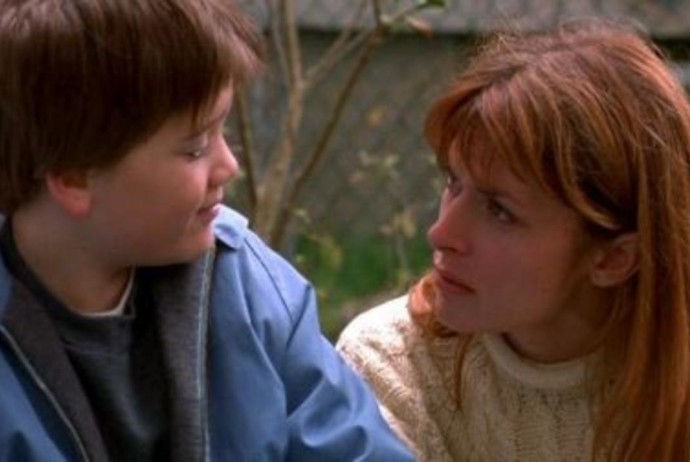Dir: Tony Barbieri
Star: Cody Morgan, Nastassja Kinski, Robert Forster, Jason Cairns
I will admit to knowing next to nothing about this one going in. It involves a kid and a sailboat? Sounds like some kind of uplifting family flick. There’s probably an adorable dog involved. I suspect these preconceptions were colored by my previous Kinski film, A Storm in Summer, and I was expecting this to play out along similar lines. In reality? Yeah, there’s a kid and a sailboat. But the adorable dog? Not so much. Instead, are you looking for abuse, mental illness and a broken family? This has you covered, in spades.
James (Morgan) is a bright and imaginative kid, who lives with his devoted waitress mother, Katie (Kinski) and her abusive, loser boyfriend, Curt (Cairns). James is befriended by retired widower Henry (Forster), whom he sees down at the dock working on his boat, and becomes Henry’s assistant. Curt is run out of the house by Kate at gunpoint after his abuse turns to her son, and James tries to match his mother up with Henry, hoping for a brighter future. However, Katie has issues of her own, her mental instability finally bursting out after Curt comes back, and leaving James at the not-so tender mercies of the child-care system.
Yeah, not exactly the heartwarming story I was anticipating, though that’s more on me than anything else. Can’t doubt Barbieri’s earnestness – he wrote the screenplay as well as directing it, and it’s clearly a topic about which he feels strongly. It manages to avoid most of the pitfalls, though some of the characters are rather too obvious – Curt, in particular, could not possibly be be more of a cliched asshole if everyone involved had tried. Fortunately, Morgan delivers a natural and unaffected performance, which matters, because he’s in virtually every scene and is the film’s emotional heart. It appears his only other role was an episode of Everybody Loves Raymond, which is surprising, since he shows no small promise here.
 James uses his imagination as an outlet from the rough world which he inhabits, such as riffing off an ancestor – the Marciano of the title – who was a diplomat, but is elevated to the King of Italy in the boy’s mind! Though this also takes him down some dark paths, most notably, the sequence where he fantasizes about shooting Curt with the gun he finds in his mother’s drawer. [As an aside: mental illness and firearms are never a good combination…] I’d perhaps like to have seen that aspect drawn out and explored more, not least because James has a good deal from which to escape. His generally upbeat and optimistic nature is in stark contrast to the intensely bipolar personality of Katie, who can flick from loving mother to scary, scary person in an instant. Mind you, her history – not least with regard to her son – appears to be a sad saga in itself, and she’s never other than someone for whom you feel sympathetic.
James uses his imagination as an outlet from the rough world which he inhabits, such as riffing off an ancestor – the Marciano of the title – who was a diplomat, but is elevated to the King of Italy in the boy’s mind! Though this also takes him down some dark paths, most notably, the sequence where he fantasizes about shooting Curt with the gun he finds in his mother’s drawer. [As an aside: mental illness and firearms are never a good combination…] I’d perhaps like to have seen that aspect drawn out and explored more, not least because James has a good deal from which to escape. His generally upbeat and optimistic nature is in stark contrast to the intensely bipolar personality of Katie, who can flick from loving mother to scary, scary person in an instant. Mind you, her history – not least with regard to her son – appears to be a sad saga in itself, and she’s never other than someone for whom you feel sympathetic.
It’s certainly a meaty role for Kinski and she does well with it. If the overall moral here may be, “Loving someone isn’t necessarily easy,” part of it may also be, at least from Curt’s perspective, “Don’t stick your dick in crazy.” Admittedly, you can hardly blame him or anyone else – since Curt is not the only one to share her bed – for overlooking Katie’s personality quirks. In Henry, she’s back to the “older man” scenario familiar from much of Kinski’s career, with Forster virtually two decades her senior, though in this case, it perhaps make sense, as he can offer James the father figure he has been missing his entire life, for reasons which are perhaps the most tragic thing in the entire movie. She’s less present in the second-half; after her mental implosion, Katie is committed to a psychiatric facility, and James has to negotiate, more or less unaided, the tricky world of care homes and foster families, a task with more than its own share of potential issues. He clings to the illusion that his mother is not mentally ill, and when that is crudely shattered, runs off to the only truly happy place he has known – Henry’s boat.
The film received next to no theatrical release, and still remains hard to locate. That’s a shame, as it’s a solid and well-made production, that deserves to be better known than its near-obscurity (it has less than 200 votes on the IMDb at the time of writing. You get the feeling Barbieri is perhaps writing about a topic of which he has personal experience, and there appears to be genuine passion brought to the results. This applies equally to Morgan and Kinski, who seem to be fully invested in their characters, and mention should also be made of Harry Gregson-Williams’s score, which does a good job of emphasizing the emotions involved, without overwhelming them. I must confess, I did find the ending a little too convenient for its own good, leaping straight into an ending that is also happier than much of the film would suggest. Although you are left uncertain as to whether Katie is “cured”, drugged into oblivion or merely enjoying one of her periodic upswings, as she stares out at the horizon from the boat.
In less sensitive hands, this could easily have toppled over into over-earnest schmaltz, or unconvincing soap-opera. Barbieri and his cast avoid either direction, and treat a sensitive topic with the necessary care to take the film’s somewhat clunky tagline, “Sometimes you must lose what you have… to find what you need”, and turn into something that actually makes sense by the time the end-credits roll.

Terrific movie! Up there with Tess and Paris Texas